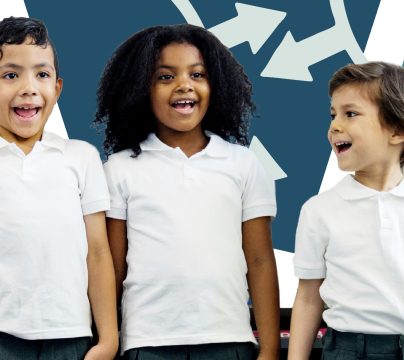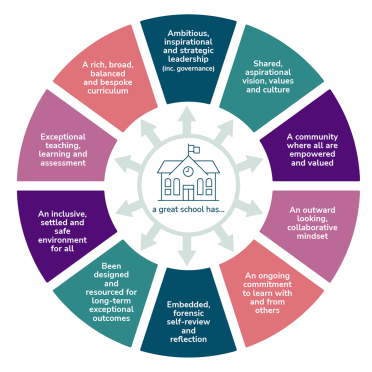The great school is committed to learning, working and growing with the wider educational community.
The school considers itself part of the local and global educational landscape, seeking to play an active role in system leadership and contributing to the outcomes and wellbeing of all young people, wherever they are educated.
Great schools constantly seek to play their part in society and be civic leaders, working with not just educational practitioners, but seeking to use best practice from all professions to build strong and improving local communities for the benefit of all.
The leaders of great schools ensure that their staff routinely challenge their own ways of working by engaging with practitioners beyond the school, identifying where outcomes and processes could be improved by working together. There is clear evidence of engaging with subject specialists, researchers, policy makers and external experts in order to inform their own practice and to contribute to the work of the wider educational community. Great school leaders seek opportunities to work closely with those in other disciplines, such as health and social services. They ensure that their collaboration with external agencies has a positive impact upon the lives of young people.
A great school enables young people to thrive in a global community. The school demonstrates its commitment to working with others, modelling effective partnership working to its pupils. It encourages young people to develop collaborative skills, providing opportunities for pupils to work alongside, and learn with and from, young people from other schools locally, nationally and internationally, whether that be face to face or by using communication technologies.
This lens will typically be reflected in:
- School vision/mission statement
- Membership of school networks e.g. HR network
- Inter-school activities e.g. Schools Sports Partnership
- Inter-school competitions e.g. debating challenges, spelling bees
- Shared staffing with other schools e.g. School Business Manager
- Inter-school moderation activities
- Use of benchmarking tools e.g. DfE financial benchmarking, EEF families of schools
General documents, policies and procedures in which you might typically see the lenses reflected.
Case studies
Resources
-
Summer 2021
Schools in their Communities: Taking Action and Developing Civic Life – Ed. Sebastian Chapleau, 2020
Spring 2020
Community Schools: People and Places Transforming Education and Communities - JoAnne Ferrara & Reuben Jacobson
Autumn 2019
Education Endowment Foundation Teacher Toolkit
School Leadership and Education System Reform - Peter Earley and Toby Greany, 2017

Ways in which HFL can provide support
Subject conferences
SEND conferences
Assessment conferences
Headteacher and senior leader conferences – Early Years, special, primary and secondary
Trust Leaders’ Forum
Subject programmes: e.g. Reading Fluency, Making Fluent and Flexible Calculators
HFL Governance conference
Governance support for formal collaborative arrangements – including, Collaboration, Federation, Amalgamation and Multi Academy Trust
Governor training
Network for schools HR professionals
Signposting to other partner organisations (Occupational Health, legal etc.) - HR Services
Data Management Services – user group
Great Expectations programme – Early Years, primary & secondary
Early Years annual CPD programmes
Early Years Leader Seminars
Joint twilight CPD sessions
Please contact us for further information on 01438 544464 or email info@hfleducation.org
The Great School Framework is made up of:
Ambitious, inspirational and strategic leadership (inc. governance)
Shared, aspirational vision, values and culture
A community where all are empowered and valued
An outward looking, collaborative mindset
An ongoing commitment to learn with and from others
Embedded, forensic self-review and reflection
Been designed and resourced for long term exceptional outcomes
An inclusive, settled and safe environment for all
Exceptional teaching, learning and assessment
A rich, broad, balanced and bespoke curriculum
The Great School Framework is the intellectual property of HFL Education and copyrighted. It may not be used unacknowledged by others.


